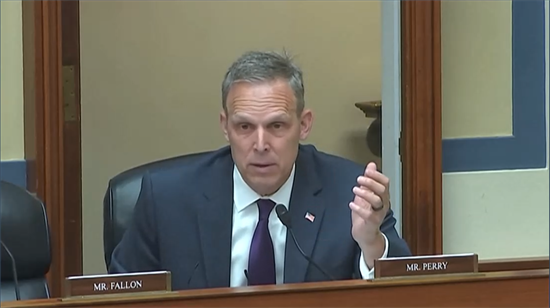In The News
Hearing Wrap Up: DoD Must Increase Transparency on Osprey Crash Mishaps and Stop Stonewalling Congressional Oversight Efforts
Washington,
June 12, 2024
The Subcommittee on National Security, the Border, and Foreign Affairs held a hearing titled, “Addressing Oversight and Safety Concerns in the Department of Defense’s V-22 Osprey Program.” Members discussed how Department of Defense (DoD) officials have stonewalled congressional oversight into the recent string of deadly Osprey crashes involving U.S. servicemen and women. The members also highlighted the litany of operational issues with the Osprey aircraft and pressed DoD officials testifying before the subcommittee what plans are in place to ensure the viability and safety of the aircraft moving into the future. Watch Congressman Perry's statement and questioning of DOD officials here: https://youtu.be/r1plyVgScMw?si=3oeHnKqi98opA6xX Key Takeaways: The V-22 Osprey aircraft has been involved in a significantly high frequency of non-combat crashes in recent years that have resulted in the loss of life of U.S. servicemen and women. The DoD has repeatedly grounded the Osprey, causing billions of dollars in aerial assets being unavailable and it is clear the Osprey presents numerous safety risks to those who operate and ride in them. Vice Admiral Carl Chebi— Commander of U.S. Naval Air Systems Command at the U.S. Department of Defense—admitted that the recently started Osprey program review is “the first comprehensive review that I have initiated in two years” despite multiple fatal crashes involving Ospreys during that period.” The DoD has presented conflicting information of whether they are conducting investigations after every Osprey crash incident and has repeatedly stonewalled Committee access to Osprey mishap safety investigations. It is critical that DoD provide this information to Congress to accurately assess the Osprey program. When pressed by Members of Congress during the hearing, DoD officials failed to confirm that they would turn over relevant information on Osprey crashes to the committee for review. Member Highlights: Subcommittee on National Security, the Border, and Foreign Affairs Chairman Rep. Glenn Grothman (R-Wis.) pressed DoD on their claims that they publicly investigate every incident where loss of aircraft or loss of life occur, yet emails received by Committee staff from DoD personnel show that is not the case. Rep. Grothman: “I’d like to enter into the record an email received from DoD personnel…the email says, and I quote ‘As for the command investigations, not all class A mishaps have a command investigation. In the last five years, there have been two command investigations related to a V-22 class A mishap.’…I’m trying to understand how the department can accurately determine issues with the Osprey aircraft, maintenance, or personnel that may have caused a mishap if there is not an investigation done with every single class A mishap?” Rep. Pat Fallon (R-Texas) highlighted the deadly toll inflicted upon U.S. servicemen and women from the string of deadly Osprey crashes across the program in recent years. Rep. Fallon: “How many deaths have occurred from accidents from the Osprey.” VADM Chebi: “Since I have been in the seat, in the last two and half years we have lost four aircraft and 20 servicemembers, and many of the servicemembers families are behind me right now. The total number of casualties is 64.” Rep. Fallon: “And I’m guessing injuries as well? How many people have survived these crashes? VADM Chebi: “The total number of fatalities that I’m tracking is 64 and 93 injuries.” Rep. Andy Biggs (R-Ariz.) inquired how often the Osprey aircraft has been grounded and unavailable for use and blasted DoD witnesses for refusing to turn over information pertinent to the committee’s investigation. Rep. Biggs: “Mr. Belk, how often has the V-22 been grounded?” Mr. Belk: “I would defer to Admiral Chebi.” VADM Chebi: “In the last two and half years that I have been here I have grounded the aircraft from my recollection at least two times…sorry three times.” Rep. Biggs: “What is the extent of the period being grounded?” VADM Chebi: “I would say four to five months.” Rep. Biggs: “You were talking about the safety investigations, and I didn’t hear a commitment that you would give us access to the investigation results, Mr. Belk, and I would like to know if you would give that access to members of this Committee?” Mr. Belk: “It remains important to protect the safety privilege for those who participate in those safety investigations and ensure those investigations and the people in them have the maximum amount of certainty that the information provided in those investigations will remain confidential and not for further disclosure.” Rep. Biggs: “So you’re telling us you’re not going to allow members of the committee to have access to the results?” Mr. Belk: “We will continue to maximize the fullest transparency possible-“ Rep. Biggs: “So here’s the deal: you don't want to give us full transparency, you want to give was whatever you manage as 'transparency', but you want the money from the taxpayer to pay for this. You understand that that's ironic? I don't mean to be disrespectful, but that is disrespectful to this body." Rep. Scott Perry (R-Pa.) questioned the motives for continuing operations with the V-22 Osprey when the human cost and loss of life continues to grow. Rep. Perry: “For the sake of those who have died, and their families are sitting here behind you, that signed up and wanted to go and support and defend their country and everything that we believe in and looked at the Osprey and said ‘this thing is awesome, I can’t wait to get in it.’ Well, there were a lot of us that said ‘holy mother of God how is thing going to stay together in flight?’ There are a lot of concerns. And we can’t for the sake of ‘well we got a lot of money invested in this thing and the train is rolling.’ People’s lives are at stake and have been lost.” |

